Mark Louden on Pennsylvania Dutch: The Story of an American Language (Interview & Book Giveaway) [Updated with Winner]
Mark Louden is a linguist, educator, and author of Pennsylvania Dutch: The Story of an American Language. Mark recently answered some questions on Pennsylvania Dutch. We’ve got that interview for you today, plus a chance to win a copy of his book (the contest has now ended – you can find the winner here).
If you’ve ever wondered about things like how close PA Dutch is to the German spoken in Europe today, differences in how it’s spoken in different Amish communities, and just what is “Dutchified” English, you should enjoy this one.

Mark currently serves as Alfred L. Shoemaker, J. William Frey, and Don Yoder Professor of Germanic Linguistics at the University of Wisconsin. Among his various projects, Mark does interpretation, translation and cultural mediation between Pennsylvania Dutch and English.
This has been an important service especially in cases when Amish have appeared in court. I first heard of the need for this during the SMV triangle cases in Kentucky several years back.
Mark also runs the website padutch.net, dedicated to the Pennsylvania Dutch language, where you can find a variety of resources including texts, grammar, and recordings (here’s one of an Amish speaker discussing making maple syrup). The materials on the site also support the ongoing Pennsylvania Dutch Documentation Project.
Mark has a deep experience with Pennsylvania Dutch, spoken today most prominently by the Old Order Amish, and has a wealth of knowledge on this language. I hope you enjoy today’s Q-and-A.
Win a copy of Pennsylvania Dutch: The Story of an American Language
You can also win a copy of Pennsylvania Dutch: The Story of an American Language.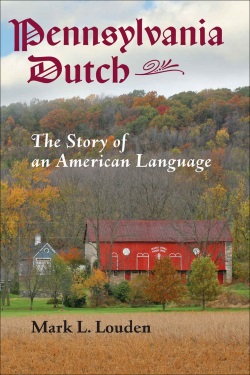
How? Simply leave a comment on this post.
We’ll draw a winner at random and announce it here next week.
Q-and-A with Mark Louden on Pennsylvania Dutch
Amish America: What is your background as far as Pennsylvania Dutch goes? How did you come to know the language, and what is your involvement with it today?
Mark Louden: Thirty-three years ago, in February of 1985, I visited an Amish church service for the first time. This was in upstate New York, where I was in graduate school. At that time I was looking for a spiritual home and curious about how the Amish lived out their faith.
I met a family who lived in the Romulus Amish community, and they invited me to church. Because I knew German, everyone assumed I could understand PA Dutch, so they only spoke that language to me, which was a great way to pick it up. About six months later, I met an Old Order Mennonite couple from the Penn Yan area and started attending services there, too.
Over the next three years, I became more and more involved in Amish and Old Order Mennonite communities in New York and in Lancaster, PA, where many families had moved from. I taught singing school for Old Order Mennonite youth for two summers in PA Dutch and also learned to lead the singing in Amish services.
In 1988, I moved to Austin, TX, to begin my career as a German professor and became involved with the Amish community that was at that time located near Gonzales. I moved onto a ranch in that community that was operated by an Amish family and lived there until I got my present job at the University of Wisconsin–Madison. I was eventually baptized at Milwaukee Mennonite Church, where I am a member today. Our church is all English-speaking, but I have close ties to many Amish communities here in Wisconsin and attend services from time to time.
Is Pennsylvania Dutch a dialect or language?
Mark: There are no scientific criteria to distinguish between “languages” and “dialects.” The labels are often arbitrary, depending on what speakers prefer. Contrary to popular stereotypes, there is no difference in complexity between languages and dialects, all are rich systems of communication that meet the needs of their users.
Most speakers of PA Dutch refer to it as a dialect of German because it is mainly spoken and not subject to prescriptive norms of usage as German and other standardized languages are. But in PA Dutch itself, there is no distinction made between languages and dialects; the word Schprooch is used to describe both. My personal preference is to call PA Dutch a language because of its independence from German.
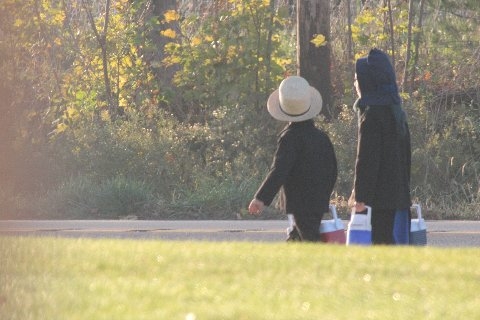
Why do we have this term “Dutch” for a German-rooted people and language? To what degree is the term “Pennsylvania German” used?
Mark: Both Pennsylvania Dutch and Pennsylvania German are correct. In the 18th century, when German speakers immigrated to Pennsylvania, the words Dutch and German were both used in English to refer to what we call “German” today. Dutch was the older and more familiar word, while German was a more formal borrowing from Latin.
The words Dutch and deutsch (‘German’) come from a common Germanic source, but Dutch is not derived from deutsch; they are linguistic cousins. The PA Dutch founding population was made up of mostly farmers and rural craftspeople, so Dutch was a more appropriate way to refer to them than German, the term preferred by city folk.
Today, Pennsylvania German is used mainly by scholars and others who want to stress the kinship between PA Dutch and German. Most speakers themselves prefer Pennsylvania Dutch.
What differences in PA Dutch exist across communities, for instance across Amish communities, or in usage by Amish vs. Mennonites?
Mark: All varieties of PA Dutch are completely mutually intelligible, but there are differences, mainly in vocabulary, depending on the region and the social or religious group to which a speaker belongs. Into the 20th century, most PA Dutch speakers were not Amish or Mennonites (“plain people” or “sectarians”), but “church people” (“nonsectarians”) whose ancestors were affiliated mainly with Lutheran and Reformed churches.
In Pennsylvania, plain people were concentrated more in Lancaster County, while church people were more numerous in Berks and Lehigh counties. Differences between these two groups reflect a general pattern of lexical variation between western and eastern counties in the PA Dutch heartland.
Within the plain community, there are some vocabulary differences between Amish and Mennonites, e.g., Wammes vs. Rock for ‘coat’, and among Amish, there are differences in the speech of Amish from or with ties to Lancaster County and “western” Amish, most of whom have a historic connection to Ohio.
One big difference between Lancaster variety and those spoken by Midwestern Amish is the pronunciation of the vowel in a word like deitsch (‘PA Dutch, German). In the Lancaster variety, the vowel rhymes with eye, while Midwestern Amish pronounce it more like the vowel in English badge.
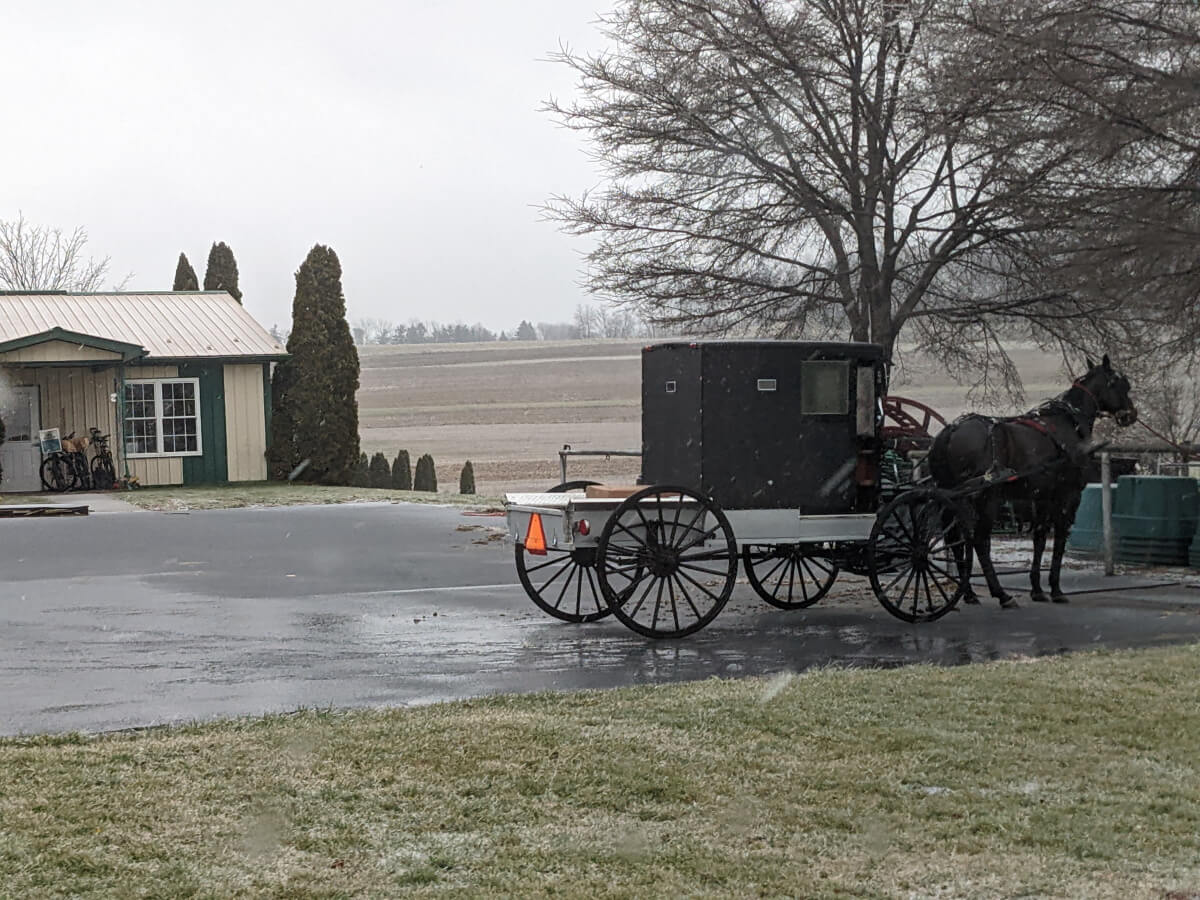
How well would an Amish PA Dutch speaker be understood in German-speaking areas of Europe?
Mark: That depends on the region. PA Dutch is most closely related to German dialects of the Palatinate (Pfalz), in southwestern Germany, so speakers of Palatine German (Pfälzisch) will recognize many similarities. But nearly three centuries of separation between PA Dutch speakers and Europe has meant that the languages on both sides of the Atlantic have diverged from one another quite a bit.
To what degree has English influenced this language?
Mark: From the start, essentially all PA Dutch speakers were bilingual to some degree, so English has left its imprint on the language, but pretty much just in the area of vocabulary.
The basic grammar of PA Dutch remains strongly Palatine German. There are four major types of English influence on PA Dutch vocabulary: words that are borrowed completely from English, e.g., Fens ‘fence’; partial borrowings, e.g., Kascheboi ‘cherry pie’ (Boi is pie adapted to PA Dutch pronunciation); Palatine German words that have shifted their meaning to match English, e.g., gleiche ’to like’; and literal translations of English words and expressions, e.g., uffgucke ’to look up (something)’.
Taking all four types of English influence together, still only about 20% of PA Dutch vocabulary is derived from or influenced by English. Standard German, for example, owes between a quarter to one-third of its words to other languages, especially French and Latin, so PA Dutch is actually a “purer” Germanic language than German is.
What is “Dutchified English”? Can you share a few examples?
Mark: Although PA Dutch speakers have always been bilingual, they often were more proficient in PA Dutch, which meant that they sometimes spoke English with a “Dutchy” accent.
For example, Joe would be pronounced like cho, zipper like sipper, eyes like ice, etc. And sometimes they would translate whole expressions from PA Dutch into English, such as Make the light out (Mach’s Licht aus).
So there is some truth to the phenomenon of “Dutchified English,” but a lot of what is passed off as such, especially in items sold to tourists, is fanciful, expressions like Throw Johnny down the stairs his hat. That sentences like this are made up is demonstrated by the fact that if you translate them back into PA Dutch, they are just as nonsensical. Today, the great majority of PA Dutch speakers are equally proficient in both English and PA Dutch.
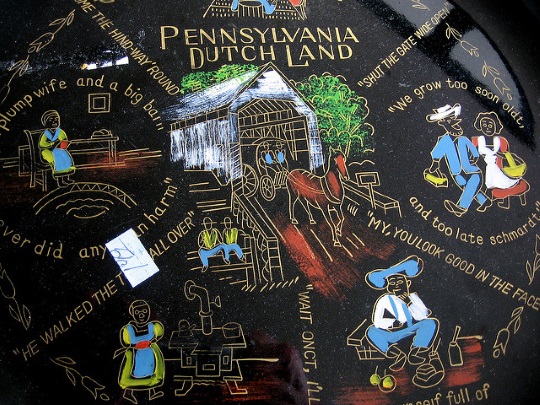
Is Pennsylvania Dutch written down? Among the Amish, isn’t the vast majority of correspondence carried out in English?
Mark: Going back to the early 1800s, native speakers of PA Dutch would on occasion write their language down, but literacy in PA Dutch has always been exceptional. This is mainly because the schools that PA Dutch children attended were either conducted in German or, since the later 1800s, English.
Amish and Old Order Mennonite parochial schools use English as the sole medium of instruction, and some teachers require that it be used at recess as well. Most schools also teach German as a subject, since that is the language of the Luther Bible and their devotional materials.
There is a fairly large body of literature in PA Dutch, especially from the second half of the 19th century and the early 20th, which was written mainly by nonsectarians. Some plain people today read and write PA Dutch actively, and in 2013, a PA Dutch translation of the Bible, Di Heilich Shrift, was completed.
We know how this language is thriving among Amish and Mennonites, but how many nonsectarians are speaking the language today? What caused this decline among non-Amish/Mennonites? Do you think it is going to die out among these people?
Mark: There are perhaps several thousand nonsectarian speakers of PA Dutch still living today, almost all of whom are in rural Pennsylvania, but almost all fluent speakers are elderly.
Continued use of PA Dutch has always correlated with a rural lifestyle, relatively limited social and geographic mobility, and especially marrying within the PA Dutch–speaking community. As far back as the early 1800s, PA Dutch speakers who moved into towns and cities, entered the professions, or married English monolinguals typically shifted to speaking English only. That trend accelerated among nonsectarians in the early 20th century, as all Americans became more mobile and the relative isolation of rural areas decreased.
That’s why there are many so-called heritage languages in the US like nonsectarian PA Dutch—such as Cajun French in Louisiana, and most Native American languages—that are in danger of losing their native speakers. The Old Orders very intentionally maintain a measure of social and geographic distance between themselves and the larger society, which enables them to “keep Dutch.” They are likely to be the sole speakers of PA Dutch within the next few decades.
What are one or two interesting or surprising things that people might not know about PA Dutch?
Mark: There is no other language in the world, large or small, that is growing faster than PA Dutch, which is due to the exponential growth of the Old Orders.
The only other languages in this small club are also spoken by highly traditional religious groups: Hutterisch/Hutterite German (Hutterites), Plautdietsch/Mennonite Low German (Old Colony Mennonites), Shwitzer/Amish Swiss German (Swiss Amish), and Yiddish (Hasidim). These groups are all similar to the Amish and Old Order Mennonites in having many children and children who make the decision as young adults to join or remain in their community.
Get a copy of Pennsylvania Dutch: The Story of an American Language
You can get a copy of Pennsylvania Dutch: The Story of an American Language via Mark’s website padutch.net, at a 30% discount (better than via Amazon). Here’s the link for that deal.
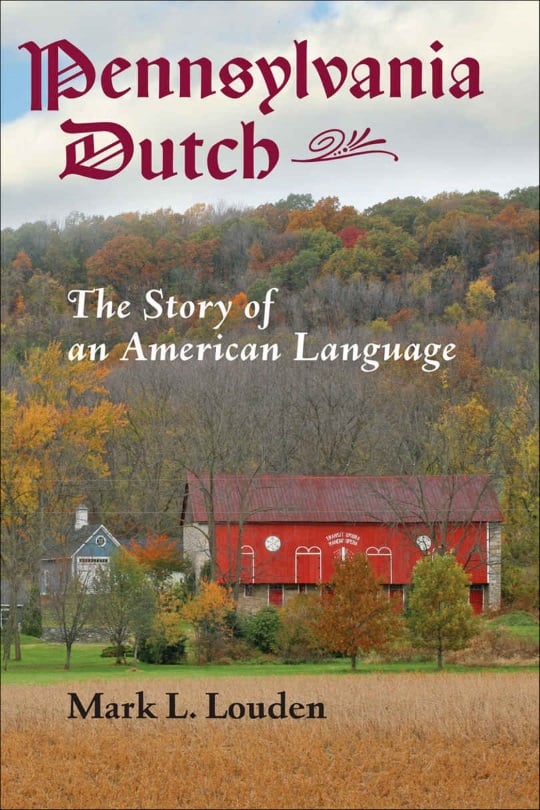


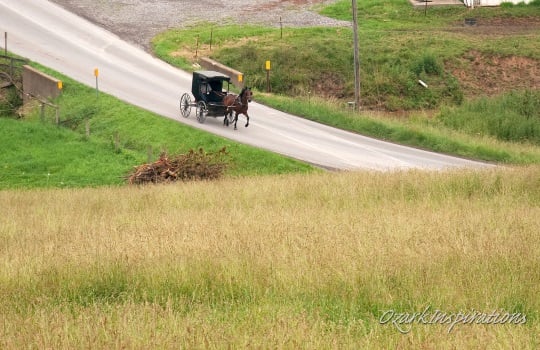

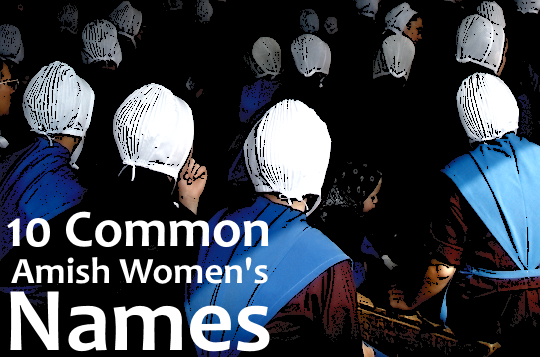


Linguistics
I studied Linguistics as a preface to my Teaching credential. I spent my time teaching English to Foreign Language Speakers and WE never studied The Amish at all. I find this fact quite unusual. The Book seems like one long time over due.
PA Dutch
I found a +hundred-year old book on the History of American Religions on Kindle a few years ago. The chapter on the German migration to Pennsylvania I found especially interesting.
When William Penn invited the Anabaptists to come, it recorded how the Germans came in 3 groups: Amish/Mennonite, Lutheran, and Moravian. The communities were so small at the beginning that all 3 German groups worshipped together, taking turns leading services in German. Then the Lutheran leaders in Germany wanted their people separated and sent my mother’s ancestors over to ordain and build churches. The Amish/Mennonite communities continued, as we know, and spread. The Moravians were kind of swallowed up/combined with others (Methodist, Baptist, etc). The history book ended before the mid-1800s, so latter immigration was not detailed.
I had never thought of Amish/Mennonites as one group before. I had always known them as separate. It will be interesting to see if your book indicates how language illustrates this historical division.
Interesting
I always thought pa Dutch and pa German were 2 different languages because I’d see some books that say pa Dutch and some say pa German. Thanks for clearing that up!!
Blessings.
Where did the word "Dutch" come from?
Mark,
I have been transporting Amish families for about 10 years and have taken them about 350,000 miles. I live in Carroll County, Ohio. Over the years, I have studied the Amish and I was told by an Amishman in PA that “Dutch” came from “Deutsch” and that “English” people in PA thought they heard “Dutch” when the Amish were actually saying “Deutsch.” We know that the Amish originated in Switzerland (Jakob Ammann), not the Netherlands. So, would you agree that “Dutch” came from “deutsch?” BTW, I spent about 500 hours transporting Sam Mullet and members of his cult in 2009. On the very first trip to his home, and taking him and 4 teen-aged girls to a chiropractor in Flushing, Ohio, I knew he was running a cult. On the way back to his home, one of the girls said, in PA German, “Who is going to see you tonight?” Then, they are giggled. Sam had a big smile on his face. He was about 63 years old at the time. Then, I found out that he was forcing all of the woman, including minor-aged girls, into his bed for sex. He told the members of his cult that the women had to have sex with him, “to purge them of the devil.” I helped a family pack up and leave Sam’s cult. I moved them back to their original community in PA. Also, I assisted law enforcement in getting evidence of crimes Sam Mullet and other cult members committed. I worked with Prof. Krabill on “Renegade Amish.” I think Johnny Mast’s book “Break-A-Way Amish” is a powerful story of how Sam operated the cult. Sam is scheduled to be released from the Elkton Federal prison on April 3, 2021. The 15 cult members convicted in Cleveland federal court are all out. Johnny Mast says that Sam has been running the Bergholz cult from prison by phone calls and letters. I don’t think Sam has learned anything while in prison. He is a very dangerous man with a demented mind and many Amish I talk to wish he would never get out of prison. If he gets released, I think he will immediately go back to his cult, east of Bergholz, and keep using and abusing the brain-washed people there. “Evil is as Evil does” and Samuel Mullet is a very Evil man, just like all cult leaders.
Hello Bob, “Dutch” is not derived from “deutsch”, the words are linguistic cousins, in the same way that English is not derived from German. All Germanic languages (including English, German, Dutch, Yiddish, Norwegian, Swedish, and more) are descended from a single ancestral language spoken about 2000 years ago that is called simply Germanic. In that language there was a word, “thiudisk”, which meant “people”. “Dutch” and “deutsch” are descended in parallel from this ancient word. Best wishes, Mark
Dutch and deutsch
Mark, Interesting and thanks for the info. I was stationed in Bremerhaven, Germany, 1967-1969, and heard the high German. I thought the word ZENTRUM–meaning the city center, was interesting. It sure looks Latin. The first thing I learned there was EINE BIER BITTE. Bob –trinken zu viel.
Yep, “Zentrum” is a good example of one of the thousands of words borrowed from Latin into German.
Thank you
Thank you for this informative interview! This sounds like a very interesting book.
Interesting
Dear Friends:
I visit the Lancaster area frequently. Once I took along my daughter who is fluent in German. She struggled to understand the Amish salespeople we met. Now I read that their language is similar to that of the Palatinate area in western Germany. My daughter was an exchange student to Thuringia not long after the Wall fell. She speaks German with a distinctly “East German” accent. I am wondering if that may be why she was stumped by the PA Dutch in Lancaster. Also, even written down, some of the vocabulary was unfamiliar to her.
All in all — a very interesting article. I was especially amazed to learn that the language is growing significantly. I’m pleased yo hear that as I believe diversity makes us all richer and I’m sorry when unique cultures are lost.
I read this blog regularly and appreciate your work in increasing my understanding of the Amish. Thank you!
Thank you so much for your comments, Gloria. Yes, German speakers regularly have a hard time understanding PA Dutch, which is due largely to the difference between Palatine German and the standard language. But two-plus centuries of separation have played a role, too. A few years ago I did a presentation in PA Dutch to a gathering of Palatine German speakers and even they had difficulties following what I was saying. In that case, the influences from English were a particular stumbling block. There are many expressions in PA Dutch translated directly from English that make no sense to German speakers. One example: Seller Kall gleicht sei Gwicht rumschmeisse ‘That guy likes to throw his weight around’. Every single word is derived from Palatine German, but the sentence is incomprehensible to someone who didn’t recognize this as a translation from English.
PA Dutch
It was helpful to hear an explanation of the differences between Midwestern and Eastern PA German. I can understand most Midwestern dutch but struggle to understand PA Dutch from Lancaster PA. Mark’s explanation was very helpful.
Thank you
Thank you for such an interesting interview. I learned a lot of new information that I didn’t know.
Part of my heritage
I’m the first generation not to speak Pennsylvania Dutch in my family – on either side since both of my parents spoke it when they were young. I look forward to reading this book.
Interesting--local scholar
Thanks for the post of this book
Thanks!
I have always been interested in the Amish and now I see them quite often. This article was very informative about their language. This book should be a very interesting read.
Contest
Oops, am I supposed to explicitly say I want to enter the contest? Because I do, please. 🙂 thanks!
No worries Jan, we count each person who comments in any form. And in case anyone’s wondering, multiple comments are very welcome here, but for the drawing we just count one entry per person. In any case thanks for sharing on this thread, it’s been an interesting one to follow 🙂
Looking forward to reading this!
pa-dutch
very interesting
YOUR LAST NAME
Hello Mark,
just curious do you know where your last name originated? Is it a PA Dutch name?
My name is of Scottish origin and meant “fire hill.” There is a place in southern Scotland called Loudoun Hill, where my ancestors likely came from. The first Loudon (original spelling) to come to America was Samuel Loudon, a printer in colonial New York who became relatively famous during the Revolution. A few years ago, I found his name on a list of patrons of a tavern in northern New Jersey who died with an outstanding tab. George Washington’s name was on the same list. 🙂
Please do not notify me of any additional posts. Right now I am on deadline. I will go on the site again when I have time.
Hi Lynn, I just removed you from comment notification. Just FYI, if you subscribe to a comment thread again in future, you should have an “unsubscribe” link in each notification email you get. Anyway I hope you’ll check back when you have time 🙂
Thank you
Thank you, Mark Louden, for sharing the PA Dutch linguistic background
information you have presented. Being not too far from Madison, I think it would be great to meet and speak with you, perhaps at UW.
Sometimes I visit the state historical society library there on
campus.
Brother Jeremy Dominic
Thank you
Thank you, Mark Louden, for sharing the PA Dutch linguistic background
information you have presented. Being not too far from Madison, I think it would be great to meet and speak with you, perhaps at UW.
Sometimes I visit the state historical society library there on
campus.
Brother Jeremy Dominic
You’re very welcome, Jeremy. I do many outreach presentations across the state every year, if you’re ever interested. Blessings, Mark
What you thought you knew.
It’s amazing what you thought that you always knew as truth turns out to be false. Many thanks for the informative article.
I found this reading very interesting. I drive for the local Amish part time and dearly love these people. Would love to know more of their language but do not want to seem to invade their privacy.
Learning PA
I think that you should learn PA Dutch, if that is what you want to do. It is a compliment to other groups when we show an interest in their language. I do not think that it is an invasion of their privacy & I do not think it would be construed as such.
You would have a great & ideal opportunity to practice your language skills with them on a regular basis! It would be an enriching experience for all concerned! I think that the only way learning PA Dutch could be considered an invasion of their privacy would be if you were to hide your acquired comprehension & proficiency from them!
My 10 year experience transporting the Amish
In my 10 years of transporting Amish, now over 350,000 miles, I have found that they don’t want to talk PA German with “English” people. They use PA German as a private way of talking so the “English” don’t know what they are saying. That’s just my opinion.
PA Dutch book
I’m looking forward to reading this. It’s so hard to find good information about the Pennsylvania Dutch. There seems to be so much confusion between Amish, Mennonite and PA Dutch. All information about the distinctions is welcome!
Thank you for this interesting interview. The book sounds interesting, too. Looking forward to reading it.
Such an interesting interview! It is so mice that PA Dutch is being preserved because so many other small languages have fallen to the wayside due to the younger generations resorting to English.
I cannot wait to read the book!
Thank you for the interesting information. My son and I have read it together. He would LOVE this book.
Amish in Wisconsin
My wife Claudia and I reside in Florida in the winter and Wisconsin in the summer. We live fairly close to one of the largest Amish Church communities there, and over the past five years have developed more than just a casual rapport with several Amish families. As a matter of fact, we feel as though we have we have become part of one family in particular and they feel the same way about us. We treat Bill and Rosetta as we do our own birth children, and their nine children as grandchildren. We spend time together at their house – and when we can rustle up transportation they all come to our house. As a matter of fact celebrating the 4th of July at our house has become a tradition with all of us getting together playing games, talking and eating. I’m in Florida at the moment but I’m looking forward to seeing our Amish family soon.
I have a van and we as a close English/Amish family go all over together. We were able to get enough transportation to take two Amish families to the zoo in Milwaukee…none of the kids had never been to a zoo and hadn’t seen some of the animals they’d read and heard about. Things we English take for granted are awesome and wonderful to the Amish.
We – Claudia and I – share in many of their traditions when at their homes, for dining or just visiting. We have learned many things from them: Claudia has picked up so many pointers doing canning with Rosetta that it’s unbelievable. And we teach them as much as we can about the English. We are not out of touch with our Amish family while we’re down here in Florida; Rosetta and the older girls correspond as regular as possible with Claudia. We know how busy all Amish are so that makes letters from them all the more precious to us.
I’m writing this now, but I shall order a copy of Mark Louden’s book when I go up north.
What a wonderful story, Kenneth, thank you so much for sharing.
Linguistics
I love linguistics… Although I’m an American Anglo, I spoke Spanish more fluently first than English, though because I’ve moved far from my hone, I’ve forgotten much Spanish, but I find many languages are somewhat similar to others. It helps.
My grandmother was descended from PA Dutch (Moravian) and still used some PA Dutch words.. growing up I thought they were words everyone used, but I found out they don’t and if they did, they tended to be country folks.
Looking forward to reading your book.
Thanks for sharing, Kim! Languages are endlessly fascinating.
PA Dutch vs. German
I recently attended the Anabaptist Identity Conference and was lodged with an Amish family. We spoke in some form of German to each other, they in PA Dutch and I in Yiddish-influenced High German with a slight Swiss accent. I had trouble understanding them, but they could recognize I was speaking High German, although the grandfather said after visiting the first night, “He knows words I don’t know.” I guessed we were even, I told them, since they know words I don’t either! Any serious conversation was carried out in unmistakable English.
It is of interest to me to note the Midwestern PA Dutch shifts the “ei” vowel in “Deitsch” to a long “a” as this is seen also in Austrian German and Polish Yiddish (Litvish, or Lithuanian Yiddish, stills rhymes the vowel with “eye”). I think Mark Louden might be onto something when he says PA Dutch is now its own language due to its separate development from mainstream German as this is similar to how Yiddish and Afrikaans became independent languages. Definitely a book I’m interested in getting! Thank you Prof. Louden for all you hard work and research on this language!
Mach’s gut!
Nicholas W.
It is interesting that all of the fastest growing languages are linked to religion and also to older dialect German, including Yiddish. And all of them are South German dialects, except for Plautdietsch.
Here are my reasons as to why the Amish have more chances and opportunities to preserve their language than ever before:
1. Even in most of the RV factories in Indiana where the Amish work in a traditional English occupation, most of the workers are themselves Amish.
2. When you look at demographics, Amish youth have many more opportunities to use their language in everyday settings than ever before (at least from a statistical point of view). Previous generations may have lived in rural isolated areas, but those areas were never exclusively Amish and therefore PA Dutch (except maybe Lancaster County, but you would have to go back to the first part of the 20th century to find a majority PA Dutch speak population inhabiting the same area as the Amish). Today, Amish youth are the majority in at least 2 traditional Amish settlements (counties). And even though the Amish are a minority in Lancaster County, they make up a majority in a number of townships within the county.
3. There are more communities than ever before, and therefore when the Amish travel by bus or train, there is a very good chance that they will run into another Amish.
If the Amish were to lose their language it would not be because of English, but because they no longer cared about passing it on. If the Orthodox Jews can preserve Yiddish and their traditions in the middle of cosmopolitan Brooklyn and NYC, so too can the Amish preserve PA Ducth…. But only if they want to.
Interesting
This was some interesting information. Thank you for sharing this interview with us. I love language and learning/teaching it too. It’s always a challenge. I wonder how teaching PA Dutch compares to English as far as grammar and spelling rules and such. Teaching my daughter the rules of English has been quite an adventure, to say the least 😉 I’d love to win a copy of this to read!
Mark Louden Pennsylvania Dutch Book
I got to meet / know Mark Louden personally when he lived in Gonzales Texas. Am looking forward to this book! Good job Mark!!
Hi Irene! Shay fa haira fun dich! Ich hoff du bisht gut an duh! Mark
The Book Draw
When is the book draw?? I am eager to order and read the book but I don’t want 2 copies! Ha, ha, ha!
I have a passion for languages! They are so much fun!
Book winner coming soon
Hi Willem, glad you asked…it will be announced in the next post, which will be up either tomorrow or Friday at the latest. Thanks for staying tuned 🙂
Pennsylvania Dutch Book Winner
I’ve just used random.org to draw a winner from your comments.
That winner came up as comment #107, Freya Birkas-Dent.
Congrats Freya! Email me your contact info at ewesner(at)gmail.com, and we’ll get your book sent to you courtesy of Johns Hopkins.
If you didn’t win, you can still pick up Mark’s book at a great discount here:
http://padutch.net/wp-content/uploads/2016/01/Louden_PA_Dutch_flyer.pdf
Thanks to everyone who commented, and to Mark for taking the time to do this interview and to reply to the comments. I found it all very interesting!
Mark Louden on Penn Dutch
Congrats Freya!
Congratulations Freya.